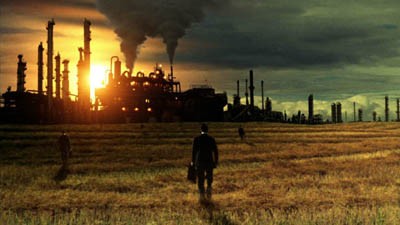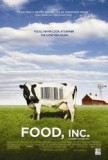| Reviews & Columns |
|
Reviews DVD TV on DVD Blu-ray 4K UHD International DVDs In Theaters Reviews by Studio Video Games Features Collector Series DVDs Easter Egg Database Interviews DVD Talk Radio Feature Articles Columns Anime Talk DVD Savant Horror DVDs The M.O.D. Squad Art House HD Talk Silent DVD
|
DVD Talk Forum |
|
|
| Resources |
|
DVD Price Search Customer Service #'s RCE Info Links |
|
Columns
|
|
|
Food, Inc.

You might want to make a trip to the grocery store before you go and see Food, Inc., because when you leave the theatre, you may find it rather difficult to go and pick out food to buy until you have wrapped your head around all the information. Then again, you might also want to go home and throw out everything in your kitchen.
Food, Inc. is a new documentary by Robert Kenner, a frequent contributor to PBS' "The American Experience," and as the title suggests, it's about how the farming industry has gone from being a business of people making an essential, quality product for other people and become a corporate concern. In this transformation, it has all but destroyed the concept of the small farmer and increasingly distanced the consumer from the product source. Broken into concise, easily digestible chapters, Kenner's film vacillates between where the food originates and where it goes, from the farm and the slaughterhouse over to the grocery store, the restaurant, and the families that end up eating the meal. In a lot of ways, it's going from the inhuman back to the human, and trying to find the spaces in between where the two sides can get back together.
Kenner builds a lot of his arguments using experts like Eric Schlosser and Michael Pollan, authors of Fast Food Nation and The Omnivore's Dilemma, respectively, and those who have read either book will find a lot that is familiar in Food, Inc.. This doesn't hurt the movie so much as it helps it, making flesh much of what the authors described, be it the negative image of overcrowded chicken farms or the more pleasant view of the Polyface Farm and its well-spoken, charismatic head farmer, William Salatin. Salatin was the best part of The Omnivore's Dilemma, and he's the best thing in Food, Inc., as well. His reclaiming of more traditional farming techniques and his common sense philosophy is one of the rays of hope in a sometimes bleak documentary. He's representative of the grassroots, one-meal-at-a-time plan to get the kinks out of our horribly twisted food chain. I'd be up for watching a whole film about Salatin should anyone care to make it.
This movie pulls no punches, make no mistake. You will see animals slaughtered, you will be forced to acknowledge where your hamburgers and your bacon comes from. (I'm a meat eater, too, so I'm not pointing any fingers.) Kenner and the food activists he portrays--from the individual farmers being squeezed to death by unfair corporate practices to the sad and angry mother whose young son's E. Coli death is the impetus for the unratified but entirely necessary Kevin's Law--see that we have moved into a deep morass where only a small handful of companies control the entire food supply. The more power they gain, the more rules they force to be changed in favor of their bottom line, leading to more business-related gains and food that is less and less safe being raised in ways that get further and further from what is practical. The public good, this film argues, has been sacrificed to the bottom line. Bicker about Big Government all you want, but deregulation seems to only help the people who don't need it. Deregulate the banks and watch people lose their homes, deregulate how our food is handled, and watch us grow weak, sick, and die.

I am sure that some will claim that Food, Inc. is not fair and does not offer the alternate side of the story, but it's a little hard to give the other side their share of time when they refuse to come forward and take it. The big companies all turned Kenner down for an interview, and their insidious infiltration of our legal system has only made it harder for the truth to be known. Kenner even dissects the moves they have made to gag their critics. Remember when the meat industry sued Oprah when she said Mad Cow Disease had caused her to stop eating hamburgers? That's just the tiny tip of it. If you've got nothing to hide, then olly olly oxen free! Come on out!
Sure, even if Tyson or Purdue sat down to be interviewed, Kenner's point of view would probably still come through. Though he offers no comment, there seems to be an underlying suspicion of the Stonyfield Farms plan for organic food world domination, and it wouldn't surprise me if there would have been similar choices made in the editing bay so that the big boys' own words made their defenses sound specious, as well. But so what? There is such a thing as facts being facts, and Kenner supports his arguments with clear, no-nonsense filmmaking. He doesn't go for cheap gimmicks or silly animation or clips from old movies, but instead does real reporting, building his case without manufacturing any cuteness.
I hate to use Food, Inc.'s own marketing tag, but in this case, the ad men have got it right. If you see this movie, you really won't look at your dinner the same way. Thankfully, the documentary ends with some suggestions of what each person can do to start changing their habits, to effect change on a small scale. While I wouldn't have minded another ten minutes in the movie that maybe took us to some actual farmers markets or walked us through some of those solutions, I do applaud Robert Kenner for not demanding the impossible, for not expecting an immediate and drastic shift. Rather, Food, Inc. is just a tiny seed, and it need only sprout into one changed point of view to get the whole garden growing.
Jamie S. Rich is a novelist and comic book writer. He is best known for his collaborations with Joelle Jones, including the hardboiled crime comic book You Have Killed Me, the challenging romance 12 Reasons Why I Love Her, and the 2007 prose novel Have You Seen the Horizon Lately?, for which Jones did the cover. All three were published by Oni Press. His most recent projects include the futuristic romance A Boy and a Girl with Natalie Nourigat; Archer Coe and the Thousand Natural Shocks, a loopy crime tale drawn by Dan Christensen; and the horror miniseries Madame Frankenstein, a collaboration with Megan Levens. Follow Rich's blog at Confessions123.com.
|
| Popular Reviews |
| Sponsored Links |
|
|
| Sponsored Links |
|
|
| Release List | Reviews | Shop | Newsletter | Forum | DVD Giveaways | Blu-Ray | Advertise |
|
Copyright 2024 DVDTalk.com All Rights Reserved. Legal Info, Privacy Policy, Terms of Use,
Manage Preferences,
Your Privacy Choices | |||||||











